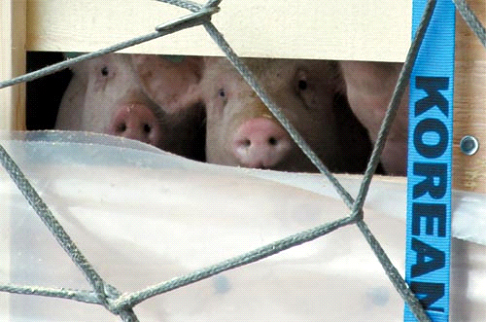
Market Information > Food News Clipping
Food News Clipping
July 11, 2011
2011.07.11
1. BILATERAL/MULTILATERAL ISSUES
EU FTA will boost green energy sector [English, CSY]
http://joongangdaily.joins.com/article/view.asp?aid=2938677
Summary: The free trade pact with the European Union that went into effect this month is expected to fuel growth for
Opposition lawmakers call for renegotiation of KORUS FTA [English, CSY]
http://english.yonhapnews.co.kr/business/2011/07/09/0502000000AEN20110709001200320.HTML
Summary: A group of lawmakers affiliated with
http://www.arirang.co.kr/News/News_View.asp?nseq=117935&code=Ne2&category=2
Full text: Meanwhile, the trade committee at
2. GRAIN & OILSEED ISSUES
http://english.yonhapnews.co.kr/business/2011/07/10/0501000000AEN20110710002900320.HTML
Summary:
ROKG Plans Higher Self-sufficiency for Agricultural Product [Korean, OSY]
http://news.donga.com/3/all/20110710/38696927/1
Summary: The Ministry of Agriculture has announced new self-sufficiency plan for food and agricultural products. The plan aims to achieve 30 percent self-sufficiency rate on food and feed products, which is 5 percent point higher than the previous policy plan developed in 2006. The Ministry stated that over 10 trillion won of budgets will be spent through 2020 to achieve the new goal.
|
Product |
By 2015 |
By 2020 |
|
Total food and feed |
30% |
32% |
|
Staple Grain (Rice, Wheat, Barley) |
70% |
72% |
|
Rice |
98% |
98% |
|
Wheat |
10% |
15% |
|
Fresh Vegetables |
86% |
83% |
|
Fruits |
80% |
78% |
|
Meat |
71.4% |
72.1% |

Imported prices of beef, pork jump in June [English, CSY]
http://english.yonhapnews.co.kr/business/2011/07/08/0502000000AEN20110708003900320.HTML
Summary: Prices of imported beef and pork in
[Reader’s Letters] Make beef rating system very simple and clear [English, CSY]
http://joongangdaily.joins.com/article/view.asp?aid=2938655
Full text: The Korea JoongAng Daily’s June 12 editorial, “Grading beef from A to E,” was very interesting. I can’t forget my first experience buying high-quality Korean beef. The beef grading system was so complicated that I spent too much time pondering what to buy. I still don’t understand why the Korea Institute for Animal Products Quality Evaluation (KAPE) puts the “A++” and “A+” ratings above an “A.” The government’s new solution, to be implemented this month, is still confusing. The main purpose of grading beef is to support consumers’ right to clearly know the quality of beef, not to give producers benefits. The KAPE must make the rating system simple and clear because classifying beef from A to E is the perfect way to rate it. --- Sue H. Kim, a
4. MARKETING ISSUES
Shinsegae Department Store Sells ‘Less Stressed’ Chicken [Korean, OSY]
http://www.yonhapnews.co.kr/economy/2011/07/09/0318000000AKR20110709036500003.HTML
Summary: Shinsegae Department Store announced on July 10 that it would sell 2,000 heads of special chicken until July 14 that were raised under less stressful environment, which according to the store met the Freedom Food standard set by the RSPCA. For example, the unit cage space was about 10 birds per sq. meter, over two times larger than conventional practice.
5. OTHER MISCELLANEOUS ISSUES
Price of Local Fresh Blueberries Plunges ….
http://www.hankyung.com/news/app/newsview.php?aid=2011070789171&nid=004&sid=0104
The information in this report was compiled by the Agricultural Trade Office (ATO) at the U.S. Embassy in Seoul, South Korea. The press summaries contained herein do NOT reflect USDA, the U.S. Embassy, or other U.S. government agency official policy or view point. U.S. food exporters can learn more about market opportunities in South Korea by reviewing ATO Seoul’s Exporter Guide and other reports available at www.fas.usda.gov by clicking on “attaché reports”.
Agricultural Trade Office, U.S. Embassy - Seoul
Tel: 82-2-6951-6848 Fax: 82-2-720-7921
Email: atoseoul@state.gov